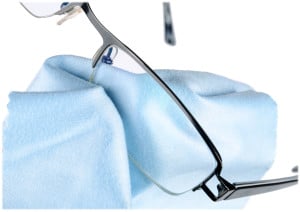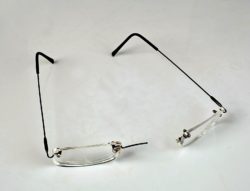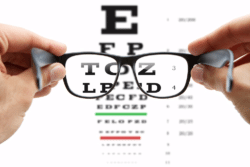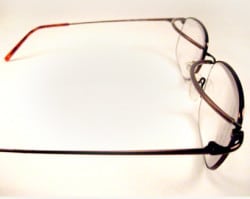Don’t you love getting new glasses? The frames are clean and tight with a fit that feels like you were born with them on your face. And the lenses – so crisp and clear, all you want to do is look at stuff. Why can’t eyeglasses stay this way? Here’s a secret… with today’s scratch-resistant lenses and titanium-strength frames, there’s no reason why they can’t. All it takes is a little knowledge and a few moments of eyeglass new TLC. Here are 4 secrets to keeping your glasses looking and feeling like new…
1. Facts about cleaning cloths:
Microfiber cloth are the recommended choice when cleaning your lenses. Often times one will come with your new glasses. But once that little towel is lost, you’re back to using paper towels and sweater sleeves, which give off lint. Rubbing lint on your lenses with a paper towel or sweater is like rubbing light sandpaper on your lenses. This is why using paper towels and/or sweaters is one of the leading causes of scratched lenses. Having multiple microfiber cloths around that are easily accessible around your home, car and work space will help to be consistent. If a microfiber cloth is not accessible look to use any soft cloth that doesn’t emit lint and wipe gently, not applying too much pressure on the lenses. Last but not least, always try to keep your cloths in a pouch or cases to avoid dust or other particles from settling on the cloth and having that play the same role as lint. A good practice is to always dust off your cloths, and if available, run your lenses under water to clear away any particles that may be on the lenses.
2. Secret Weapon
Okay, maybe not so secret, but that eyeglass cleaner you’ve always scoffed at buying? It’s a big factor in keeping your lenses crystal clear and scratch free. However, not all cleaners are the same.
Read the label:
Stay away from any cleaner that may have ammonia or alcohol. We know it’s tempting, but refrain from using those ordinary glass cleaners that are under the sink (ex/ Windex, 409). Ammonia and alcohol are considered strong solvents that will compromise, if not ruin, important coating that may be on your lenses especially any anti-reflective coating. Here’s something you probably already know – scratch-resistant doesn’t mean scratch proof.
Bonus Tip: While they are convenient, pre-moistened lens towelettes should only be used sparingly and as a last resort. Towelettes can get pricey and because of the infused chemicals, they usually are not recyclable. Also, if you do have to use a lens towelette, remember to rinse your lenses before wiping, as dirt particles could potentially leave trace scratches.
3. There’s a Method
Now it’s time to put that microfiber cloth and lens-specific cleaning solution to work. First, spray the cleaner on the front and back of each lens. Wipe dry with your microfiber cloth. Then, buff the lens with a dry part of the cloth. Do this at the end of each day and store your glasses in their original case. Not only do your lenses attract dirt and dust throughout the day, your face and fingers may leave an oily residue behind – that goes for the frames too. And speaking of frames…
4. Maintain the Frame
You’re an eyeglass wearer, so naturally you own an eyeglass repair kit. Right? If not, go to your corner drugstore or online merchant and buy an eyeglass repair kit. Yes, even the plastic tube keychain with a flea-sized screwdriver inside will do. However, if possible, try to get a proper repair kit, with a human-sized optometric screwdriver and a few replacement screws included. A proper kit will run you anywhere from $10 to $20 dollars.
Once you have your kit, pick a day of the week to do a routine maintenance. Check the overall condition of your frame before preparing to perform your maintenance. Tighten the following small screws on the frame:
• Hinge temple of the frame – Place a microfiber cloth on a countertop or hard surface to serve as a buffer so you can rest your eyeglasses to secure the frame. This will allow you to put pressure on the frame as you’re turning the optometric screwdriver. 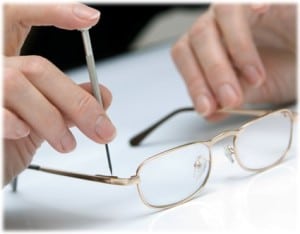
• Eye-wire where the lens is held into the frame – This screw is usually located at the top and inside area of the frame. Turn the glasses upside down, bracing the frame on the same hard surface (w/ Microfiber cloth) as before and tighten the screw head. Remember not to over-tighten, or press too hard on the screw head – you don’t want to damage the frame, strip or break the screw.
Despite the name, “eyeglass repair kit” is only meant for simple maintenance. If you notice that your frames are bent or the lens cracked or damaged, don’t try to fix them yourself. Contact the experts at fixfyglasses.com for advice or repair.
Eyewear frames are like shoes – you have to wear them a while before you may start to notice uncomfortable points that may need adjustment. We all have unique face shapes, nose bridges, eye distance and more to work with when considering a new pair of frames. Most frames may be adjusted to accommodate these features.
Multifocal Lenses:
If you’re wearing bifocals, trifocals, progressive, occupational or computer lenses, Proper adjustment is crucial for optimal vision acuity. Proper adjustment usually resolves any issues with blurred vision while wearing your glasses.
Bottom line: The only reason you wear glasses is so you can see … But if your glasses don’t sit properly on your face, you are depriving yourself of optimal vision. Be sure to get your eyeglass frame adjustment right so that your prescription can do its job and help you see accurate and sharp imagery as you as intended.
Temples: Your eyeglasses should not press against your temples, or be too wide. Your optician will adjust the glasses so this isn’t a problem. If your glasses are leaving indentations on the side of your head, that’s a sign they’re not fitted properly. They should not be pressing against the skin at all. The pressure points should be behind the ear and laying gently on your temples.
Ears: Often times, our ears are often not symmetrical. Your optician will adjust your frames to make up for that lack of symmetry.
Nose: If your eyeglasses are leaving indentures on your nose, this is a sign that your nose pads are not properly adjusted. It can also mean that your nose pads are too small. Nose pads should be the proper size according to the size of the lenses and frame to help distribute the weight evenly across your nose bridge.
Lenses: Your lenses should be adjusted according to the type of lens fitted (Single vision or multifocal lens). There is a standard focal point created for each patient’s individual facial measurements, prescription needed and patient comfort range.
Tips from the Pros
If your eyeglasses are broken, you should always have a backup pair. And while wearing your backup pair, I recommend getting your broken pair fixed at wwww.fixmyglasses.com.

